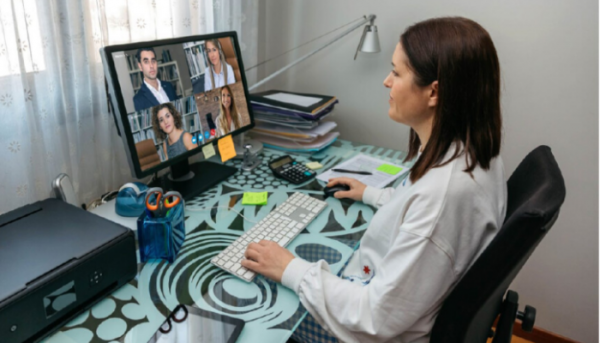Remote working has become a permanent feature of the new business landscape.
Some estimates predict 50% of people will not return to offices – a seismic shift that will have huge implications both for recruitment and employment in the years ahead.
Back in March 2020, during the early days of lockdown, there was a certain novelty to meetings that took place via virtual platforms such as Zoom and Teams. People were generally relaxed – bound by a shared sense of bewilderment at the crisis unfolding around us and a resolve to pull together to get through it and interruptions by children or pets were not only tolerated but provided light relief.
This remains the case to an extent, but as remote working becomes a fixture of many of our lives the way we present and communicate virtually – whether in interviews or meetings – will increasingly reflect on us as individuals and shape how current as well as prospective employers view us.
Remote interviews and meetings require a different set of disciplines and methods of preparation to ensure they are a success. Recruitment specialist Anthony Gregg, Chief Executive at Anthony Gregg Partnership, has the following advice.
Advice to ensure your body language does not hold you back in remote working
Get comfortable
Your first priority should be to create a healthy environment. Make sure you’re sat comfortably and adopt a good posture – sitting up straight, with your feet flat on the floor increases chemicals in the bloodstream that lead to a feeling of mental balance. As far as possible find a room where you’re unlikely to be disturbed and where the WiFi connection is reliable. Anxieties over being interrupted by kids or losing connection are distractions you can do without and will become apparent to others through your facial expressions and levels of concentration.
Dress appropriately
The temptation to work in your pyjamas may be hard to resist but resist it you must. Dressing for a working day not only demonstrates professionalism, it helps psychologically to create a degree of separation between your personal and work life. Dressing smartly can also increase your own feelings of confidence and those who keep their appearance neat are more likely to be attributed with positive values and qualities. If in doubt, wear the clothes you would wear if you were meeting the same group of people in person.
Choose your background wisely
Remote meetings have allowed us to peek into the personal lives of our colleagues through the lens of their computer camera. For job interviews in particular, it’s important to choose a background that hints at your personality without becoming a distraction of itself. A plain white background risks coming across as dull, while at the other end of the scale a bookshelf full of controversial texts or strange paraphernalia will create an immediate impression of the person that is hard to shift. Aim for a happy medium between the two.
Make eye contact
A major downside to remote meetings is the lack of physical interaction. When we’re in the same room as people we pick up so many of our cues from their facial expressions and mannerisms. Make an effort to be as engaging on a virtual call as you would be in person. This starts with making eye contact, which is much harder to do remotely. One tip is to have a written reminder in front of you to look into the camera rather than staring blankly into the screen. You should also make a conscious effort to exaggerate your hand gestures, facial expressions and other non-verbal responses.
Avoid nervous tics
Besides the risk of spreading infection, actions such as face touching, nose scratching, hair smoothing or ear tugging are also indicators of nervousness. By consciously resisting the impulse to make these movements you will show others that you are calm, collected and focused on the task in hand. Breathing techniques can help us stay relaxed at any time of day and are especially helpful ahead of a demanding meeting or interview. Focus on breathing steadily, in through the nose and out through the mouth, counting the in and out breaths to compose and steady yourself.
More advice can be found in nijobfinder’s career advice area.


